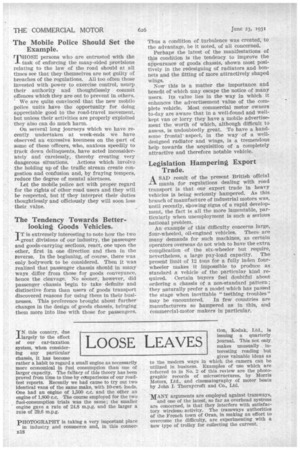The Mobile Police Should Set the Example.
Page 32

If you've noticed an error in this article please click here to report it so we can fix it.
TIEIOSE persons who are entrusted with the task of enforcing the many-sided provisions relating to the law of the road should at all times see that they themselves are not guilty of breaches of the regulations. All too often those invested with power to exercise control, usurp their authority and thoughtlessly commit offences which they are out to prevent in others.
We are quite convinced that the new mobile police units have the opportunity for doing appreciable good to the road-travel movement, but unless their activities are properly exploited they also can do much harm.
On several long journeys which we have recently undertaken at week-ends we have observed an excessive keenness on the Tart of some of these officers, who, anxious speedily to track down delinquents, have acted inconsiderately and carelessly, thereby creating very dangerous situations. Actions which involve the holding up of the traffic stream create congestion and confusion and, by fraying tempers, reduce the degree of mental alertness.
Let the mobile police act with proper regard for the rights of other road users and they will be respected, but if they interpret their duties thoughtlessly and officiously they will soon lose their value.
The Tendency Towards Betterlooking Goods Vehicles.
TT is extremely interesting to note how the two -I-great divisions of our industry, the passenger and goods-carrying sections, react, one upon the other, first in one direction and then in the reverse. In the beginning, of course, there was only bodywork to be considered. Then it was realized that passenger chassis should in many ways differ from those for goods conveyance, hence the cleavage. No sooner, however, did passenger chassis begin to take definite and distinctive form than users of goods transport discovered reasons for using them in their businesses. This preference brought about further changes in the design of goods chassis, bringing them more into line with those for passengers. Thus a condition of turbulence was created, to the advantage, be it noted, of all concerned.
Perhaps the latest of the manifestations of this condition is the tendency to improve the appearance of goods chassis, shown most positively in the redesigning of radiators and bonnets and the fitting of more attractively shaped wings.
Now this is a matter the importance and benefit of which may escape the notice of many users. Its value lies in the way in which it enhances the advertisement value of the complete vehicle. Most commercial motor owners to-day are aware that in a well-found and wellkept van or lorry they have a mobile advertisement the worth of which, although difficult to assess, is undoubtedly great. To have a handsome frontal aspect, in the way of a welldesigned radiator and wings, is a tremendous help towards the acquisition of a completely attractive and therefore notable vehicle.
Legislation Hampering Export Trade.
A SAD result of the present British official mania for regulations dealing with road transport is that our export trade in heavy vehicles is being seriously hampered. As this branch of manufacture of industrial motors was, until recently, showing signs of a rapid development, the fact is all the more lamentable, particularly when unemployment is such a serious national problem.
An example of this difficulty concerns large, four-wheeled, oil-eng,ined vehicles. There are many demands for such machines, as certain operators overseas do not wish to have the extra "complication of the six-wheeler but require, nevertheless, a large pay-load capacity. The present limit of 12 tons for a fully laden fourwheeler makes it impossible to produce as standard a vehicle of the particular kind required. Certain buyers feel doubtful about ordering a chassis of a non-standard pattern ; they naturally prefer a model which has passed the stage when inevitable "teething troubles" may be encountered. In few countries are manufacturers so hampered as in this, and commercial-motor makers in particular.




























































































